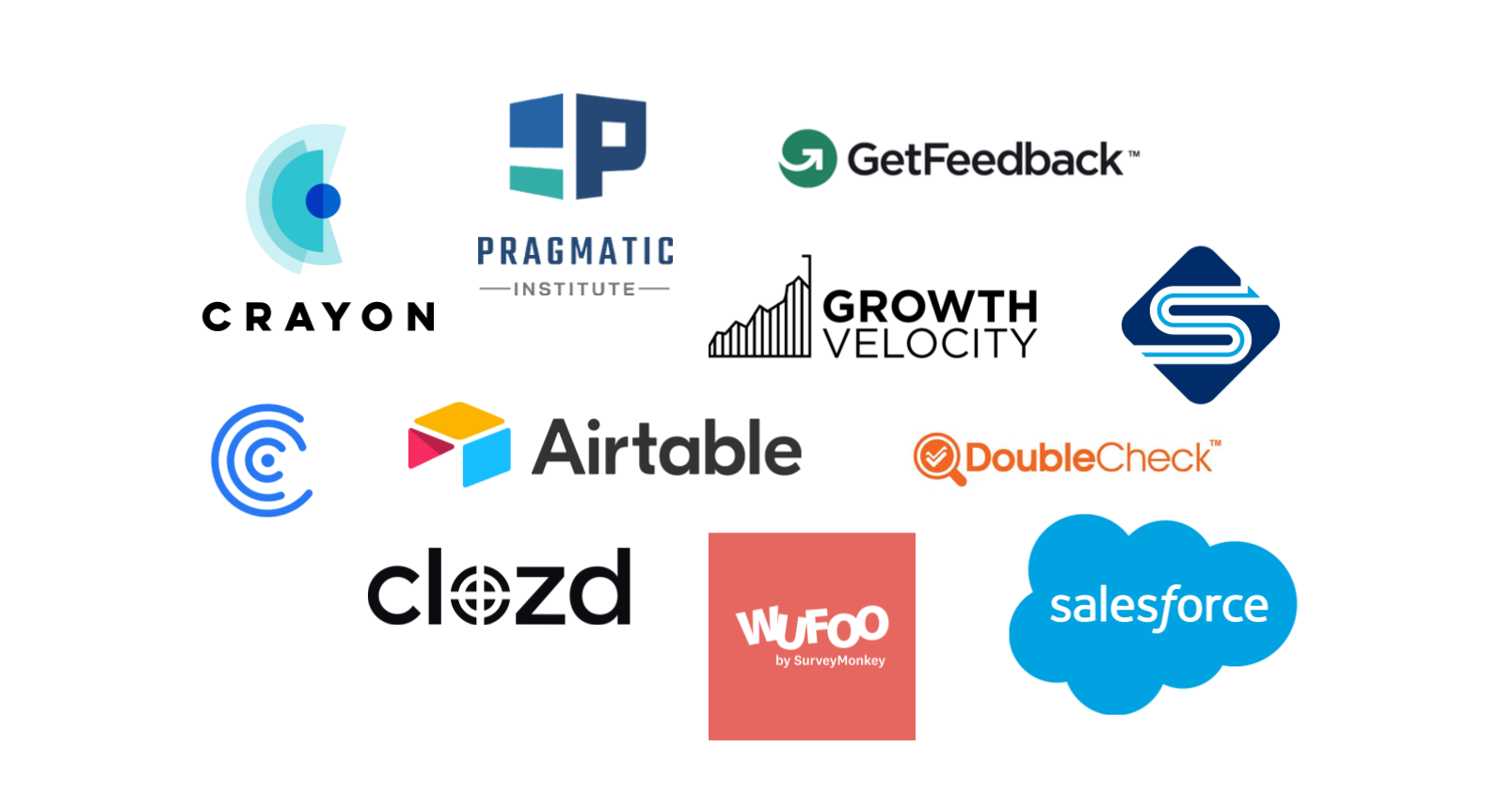Win/Loss Analysis Templates - A Buyer’s Guide
Win/Loss Analysis is an essential tool for understanding what’s working and what’s not in your go-to-market strategy. Insights from Win/Loss Analysis enable sales, marketing, and product teams to prioritize changes that will improve outcomes.
If you want to conduct a Win/Loss Analysis, finding a template is a great place to start.
The hard part is that there are so many templates to choose from. You’ll find “about 9,880,000 results” when you Google “win/loss analysis template.”
Methodology
As a Win/Loss Analysis service, we’ve studied plenty of templates on the market, and we know which templates are best suited for different business needs.
In this post, we’re going to go over some of the many different Win/Loss Analysis templates to help you find one that best meets your needs.
To select the best, we looked for templates that delivered both the big picture context and the nitty gritty details you’ll need to implement a win/loss program. Win/Loss Analysis has intricacies that can make delivery more time consuming and the outputs less convincing.
Organized by Data Source
We’ve organized this buyer’s guide to Win/Loss Analysis templates by data source.
The exact steps you’ll take to gather win/loss data, prepare it, analyze it, and then report your findings all depend on the data source.
For example, you’ll have to decide what questions you’ll ask if your data source is buyer interviews and buyer surveys. When you use CRM data for your Win/Loss Analysis, the data has already been collected.
The analysis and reporting phases are different, too. Analyzing a ten page long transcript from a buyer interview is very different from the quantitative analysis of hundreds of survey responses or CRM records.
Win/Loss Analysis In Salesforce
You’ve got a lot of options for Win/Loss Analysis if Salesforce is your CRM.
Salesforce has its own native reporting capabilities. Then there are the half-dozen or more apps with Win/Loss Analysis capabilities on the Salesforce AppExchange. And Salesforce and Hubspot data can be exported to a Google Sheet template like Coefficient’s.
 The free Sales Competitor Analysis Tool from Salesforce Labs enables reps to log multiple competitors per opportunity and then analyzes the data to report competitive performance. Alternatively, you can build your own Salesforce Win/Loss Analysis reports or dashboard. This article on Trailhead gives step-by-step instructions.
The free Sales Competitor Analysis Tool from Salesforce Labs enables reps to log multiple competitors per opportunity and then analyzes the data to report competitive performance. Alternatively, you can build your own Salesforce Win/Loss Analysis reports or dashboard. This article on Trailhead gives step-by-step instructions.
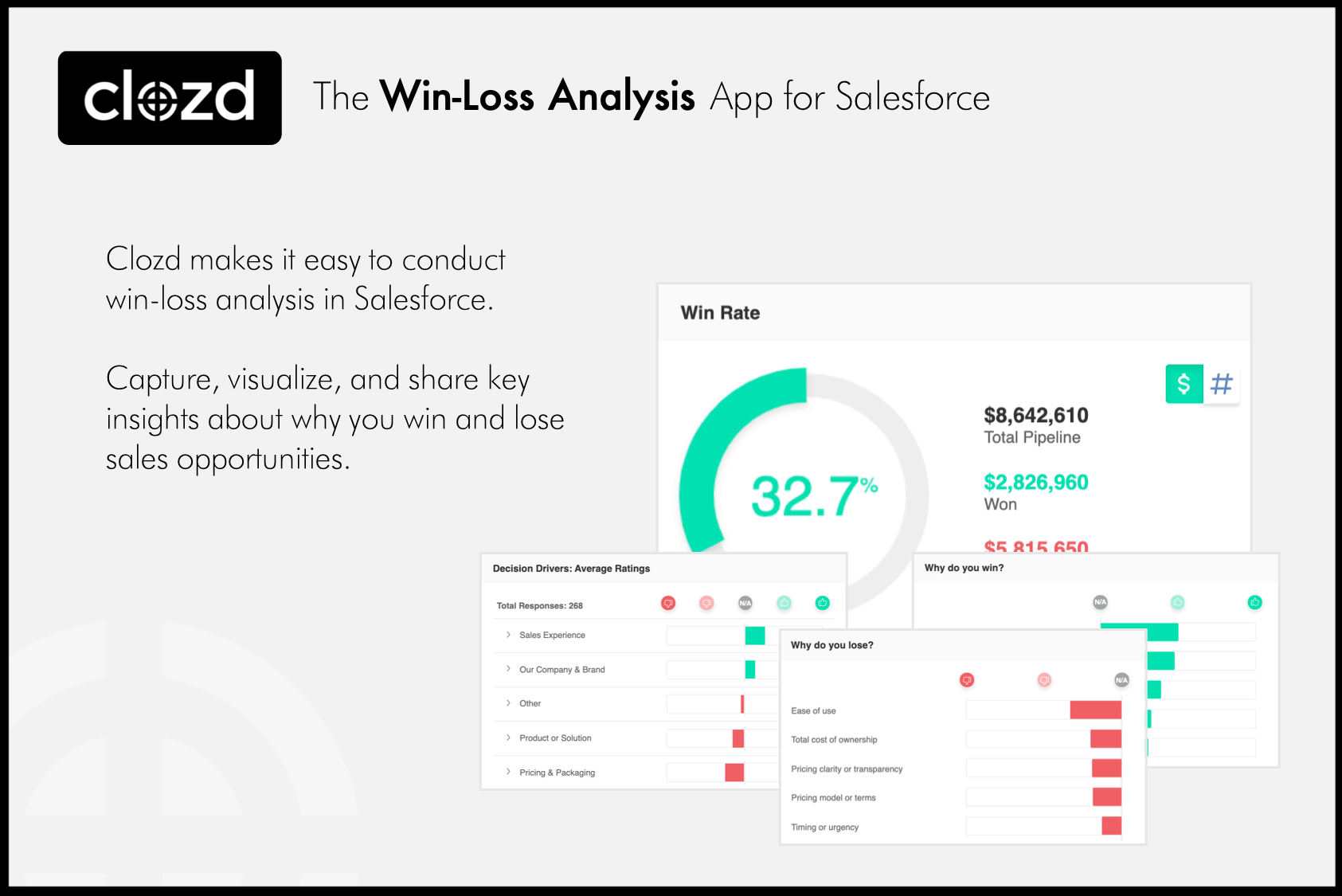 Clozd has built a Salesforce app for Win-Loss Analysis that takes it one step further by surveying sellers and combining that data with opportunity data already in Salesforce. Check out the win/loss templates in InsightSquared and Clari if you simply want to analyze and report the win/loss data that’s already in your Salesforce.
Clozd has built a Salesforce app for Win-Loss Analysis that takes it one step further by surveying sellers and combining that data with opportunity data already in Salesforce. Check out the win/loss templates in InsightSquared and Clari if you simply want to analyze and report the win/loss data that’s already in your Salesforce.
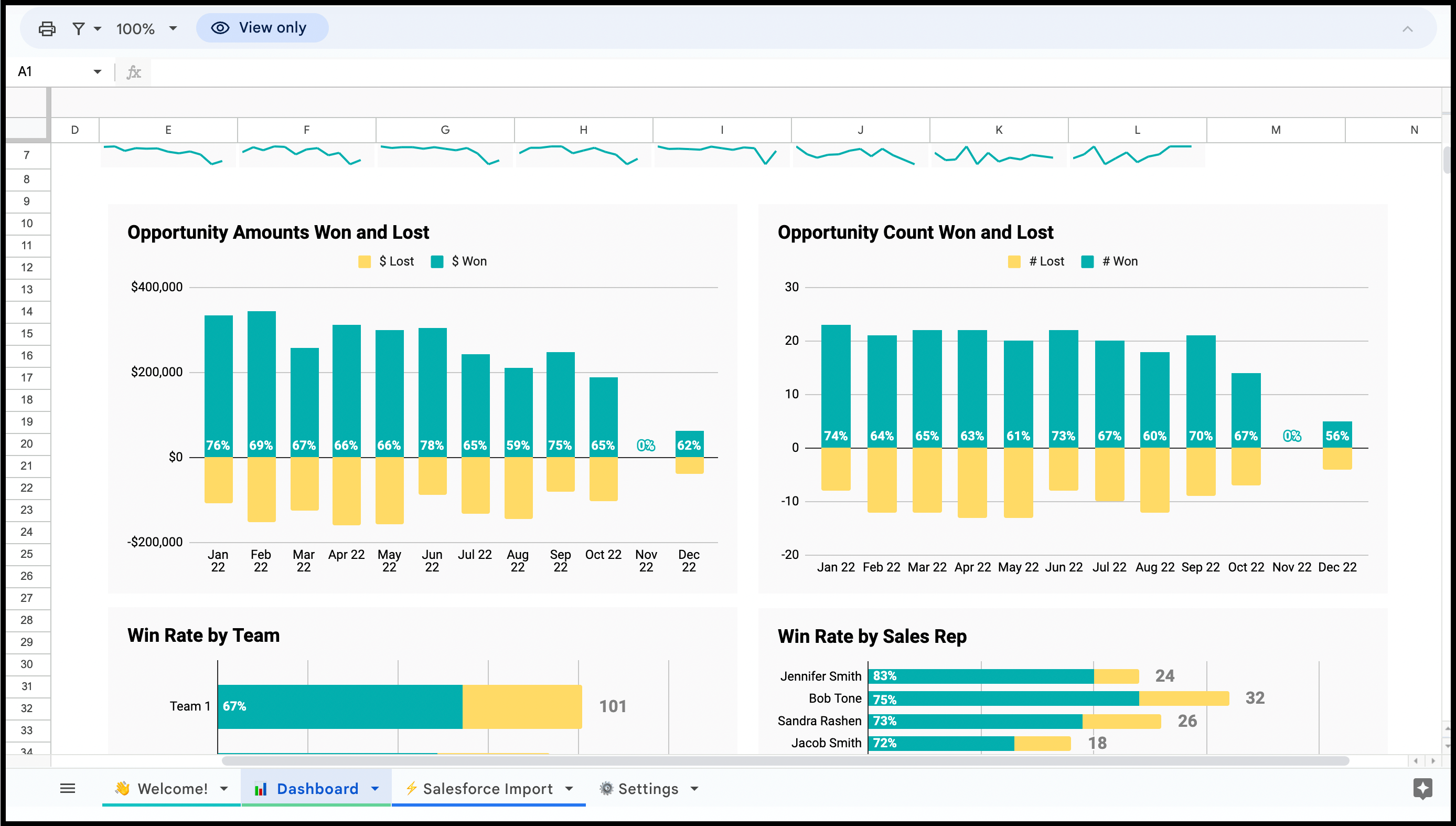 Coefficient’s Win-Loss Analysis Template for Google Sheets uses your Salesforce data to report win rate by lead source, industry, etc. Use the Hubspot version of Coefficient’s template if that’s your CRM.
Coefficient’s Win-Loss Analysis Template for Google Sheets uses your Salesforce data to report win rate by lead source, industry, etc. Use the Hubspot version of Coefficient’s template if that’s your CRM.
Win/Loss Analysis Templates When Your Data Source Is Buyer Interviews
We found three categories of templates when the data source is win/loss buyer interviews:
-
- Step By Step
- Interview Questions
- Analysis.
(1) Win/Loss Analysis Step by Step
A step-by-step template covers key success factors from beginning to end, such as: who you interview, who conducts the interview, what questions are asked, what analysis is done to unearth insights, and what recommendations can be made.
 We recommend Satrix Solutions’s The Ideal Win/Loss Analysis Template. This template covers essential skills required of interviewers (strong listening skills, experience operating at senior levels, understands the competitive landscape). It makes recommendations about win/loss program criteria (which wins and losses will be targeted). It gives guidance about questions to ask (a carefully thought-out list of topics to steer the interview). Finally, it summarizes key strategies for the overall success of the program.
We recommend Satrix Solutions’s The Ideal Win/Loss Analysis Template. This template covers essential skills required of interviewers (strong listening skills, experience operating at senior levels, understands the competitive landscape). It makes recommendations about win/loss program criteria (which wins and losses will be targeted). It gives guidance about questions to ask (a carefully thought-out list of topics to steer the interview). Finally, it summarizes key strategies for the overall success of the program.
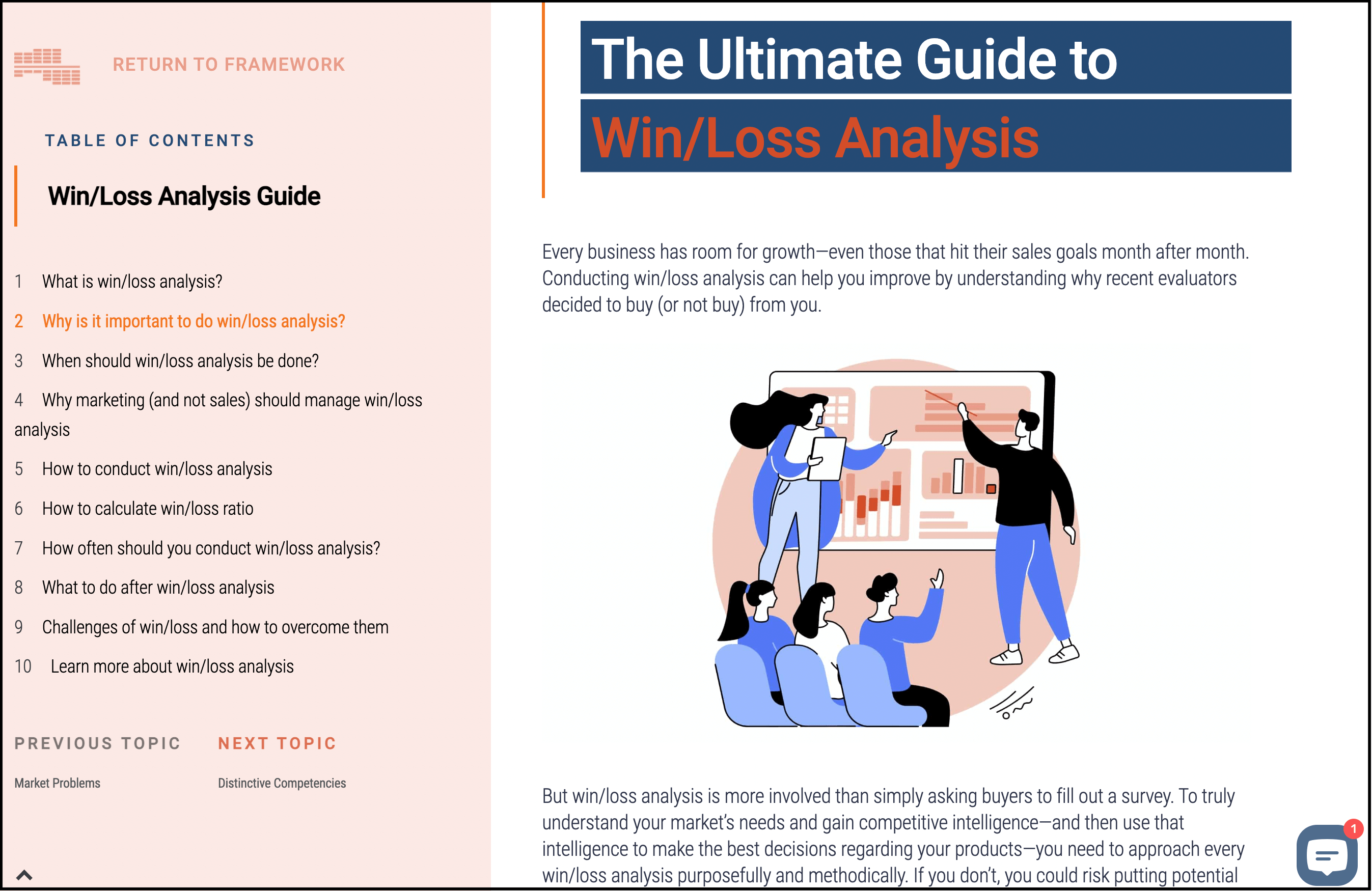 Pragmatic Institute’s Ultimate Guide to Win/Loss Analysis is also worth noting. This template makes the case for approaching every Win/Loss Analysis purposefully and methodically so you can “gain insight into your market and amass real data that can inform decisions about your products, sales processes, and marketing strategies.” It describes how to conduct a Win/Loss Analysis, as well as what to do before, during, and after the interview.
Pragmatic Institute’s Ultimate Guide to Win/Loss Analysis is also worth noting. This template makes the case for approaching every Win/Loss Analysis purposefully and methodically so you can “gain insight into your market and amass real data that can inform decisions about your products, sales processes, and marketing strategies.” It describes how to conduct a Win/Loss Analysis, as well as what to do before, during, and after the interview.
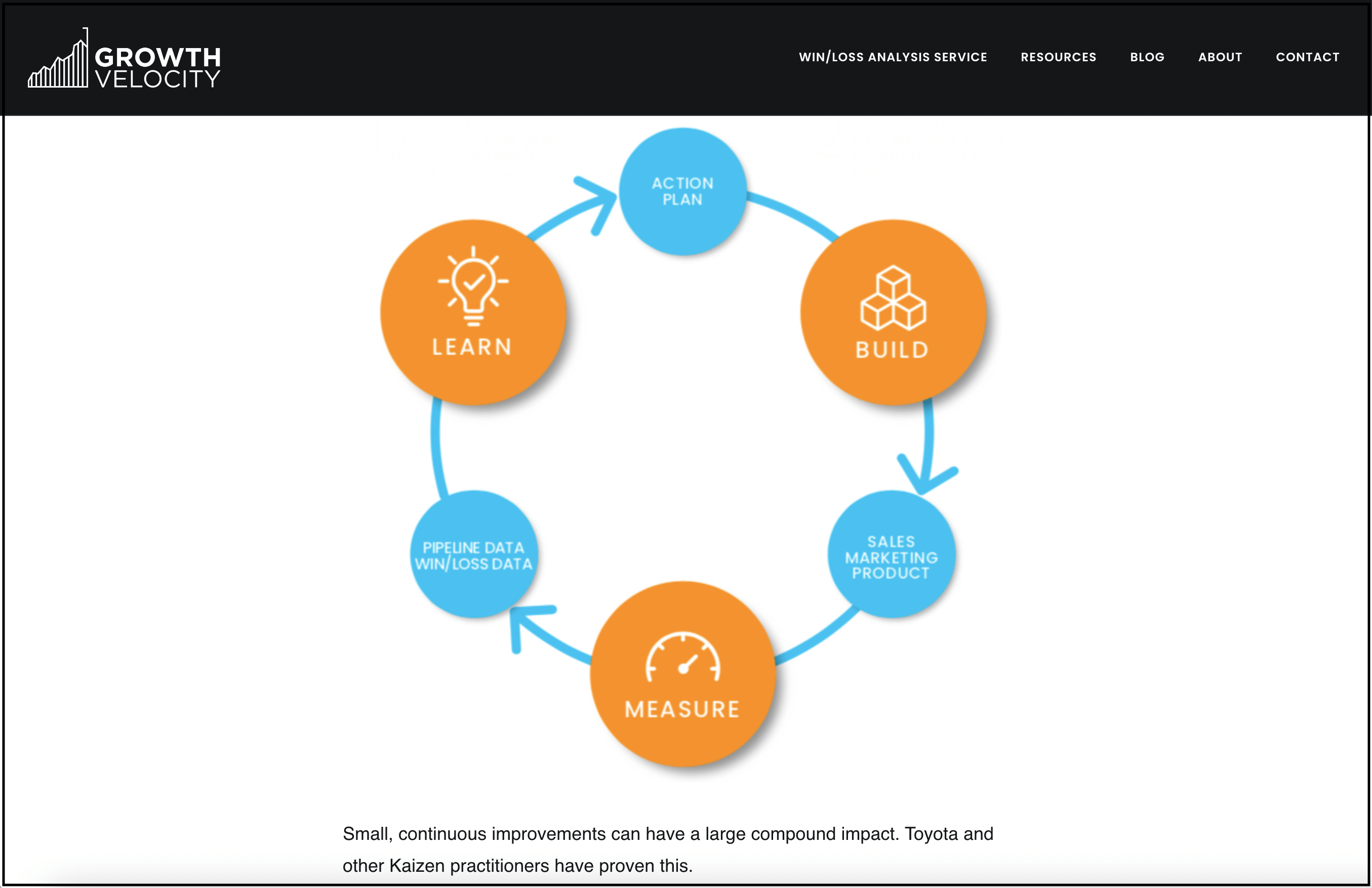 Growth Velocity’s How to Conduct a Win/Loss Analysis is a comprehensive how-to guide that outlines the 7-step fully vetted process that Growth Velocity uses with its clients.
Growth Velocity’s How to Conduct a Win/Loss Analysis is a comprehensive how-to guide that outlines the 7-step fully vetted process that Growth Velocity uses with its clients.
(2) Interview Question Templates
I find most buyer interview templates to be too optimistic, but they are useful as a source of inspiration or jumping off point for building your own interview template.
The quintessential challenge in buyer interviews is balancing competing impulses between rigidity and spontaneity.
You have what’s effectively 25 minutes (allowing 5 minutes for tardiness and logistics) to cover a longer list of topics than you will have time for. And every response from your buyer/interviewee offers tantalizing avenues for spontaneous exploration.
How do you conduct an interview that stays focused on key points and still leaves room for unexpected insights?
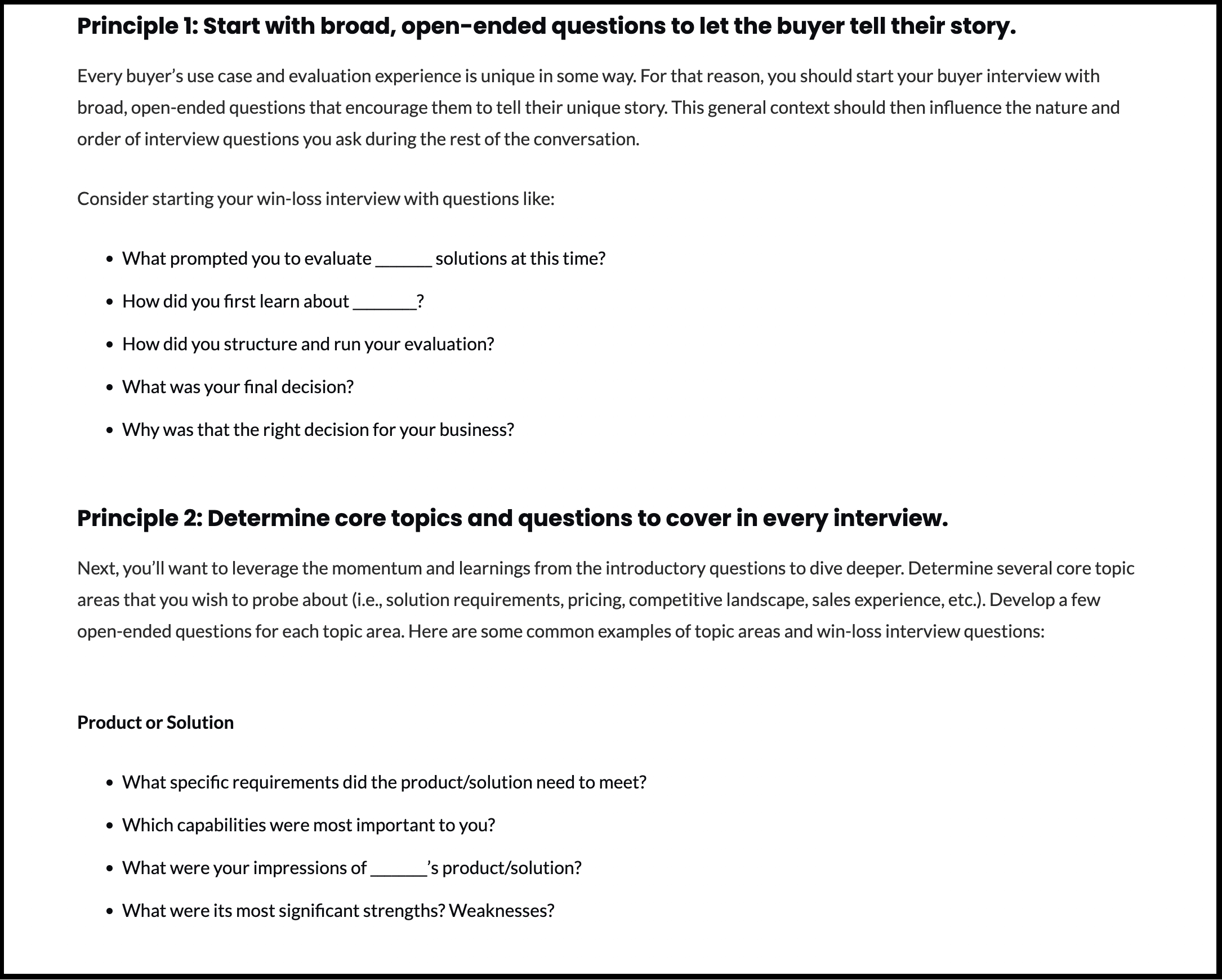 We recommend A Framework for Creating the Right Win-Loss Analysis Questions by Clozd. The best attribute of this template is that it isn’t a template but a framework you can use to create the win/loss questions that work best for you. Sample questions illustrate five key principles, such as “start with open ended questions to let the buyer tell their story” and “determine core topics to cover in every interview” such as product, sales experience, and pricing.
We recommend A Framework for Creating the Right Win-Loss Analysis Questions by Clozd. The best attribute of this template is that it isn’t a template but a framework you can use to create the win/loss questions that work best for you. Sample questions illustrate five key principles, such as “start with open ended questions to let the buyer tell their story” and “determine core topics to cover in every interview” such as product, sales experience, and pricing.
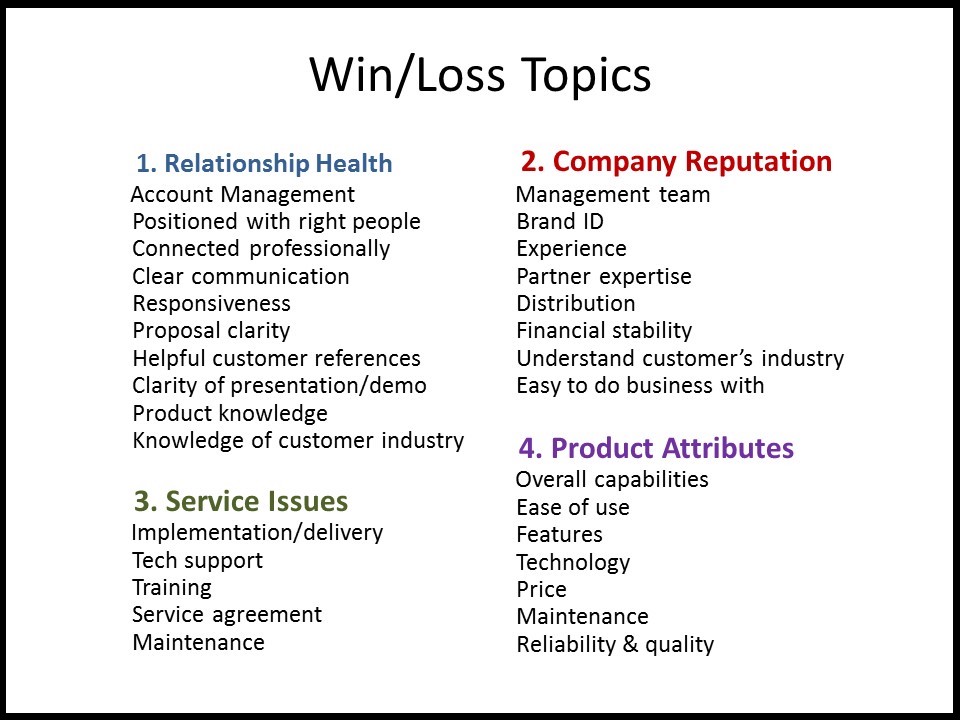 Also recommended is Win/Loss Topics by Ellen Naylor. This is a one page summary of interview topics categorized by Relationship Health, Company Reputation, Service Issues, and Product Attributes.
Also recommended is Win/Loss Topics by Ellen Naylor. This is a one page summary of interview topics categorized by Relationship Health, Company Reputation, Service Issues, and Product Attributes.
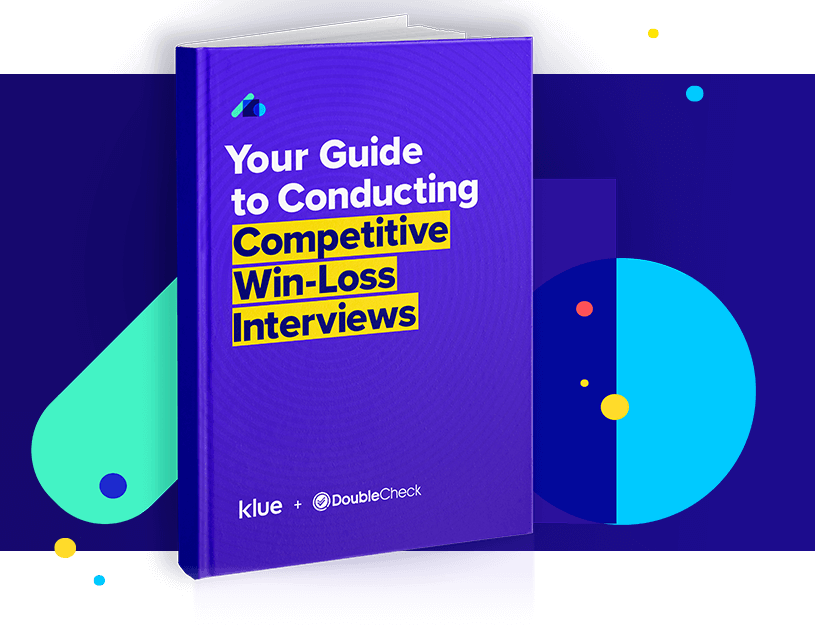 Klue’s Guide to Conducting Competitive Win-Loss Interviews suggests questions in 10 categories like Requirements, Competition, and Price.
Klue’s Guide to Conducting Competitive Win-Loss Interviews suggests questions in 10 categories like Requirements, Competition, and Price.
(3) Templates for Analyzing Win/Loss Buyer Interviews
A set of twenty buyer interviews will likely produce 200+ pages of interview transcripts.
This makes it critical to distill all that data down into the key patterns driving wins and losses.
We use a process of coding and counting to do this. The interview text is coded on dimensions like loss reason, decision criteria, and competitors. The prevalent patterns are then identified by counting: the total number of times, the number of times in wins, the number of times in losses and so on.
In the olden days, the template for this code and count analysis was software you loaded onto your computer like an Excel spreadsheet or a specialized tool like MaxQDA. Today, there are dozens of SaaS products available. G2 lists 28 SaaS products for user research as of December 2022.
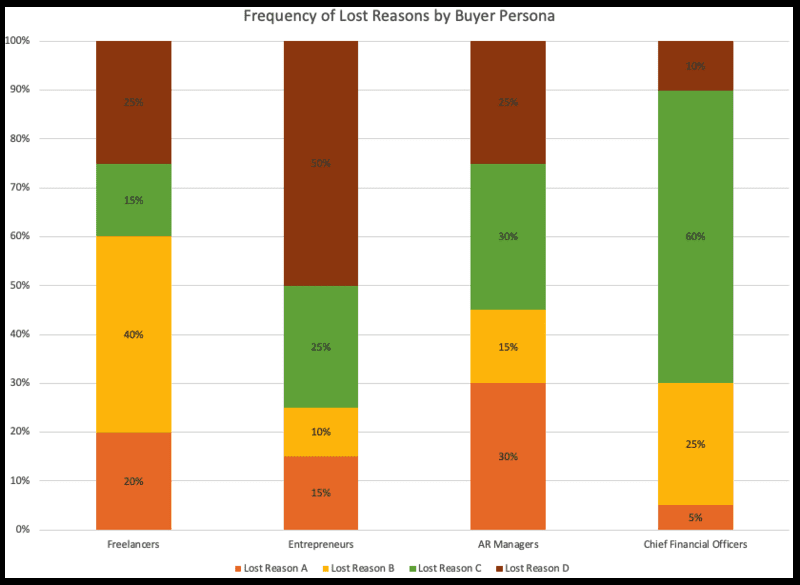 The simplest template for code and count analysis is an Excel spreadsheet. Crayon’s Three Win/Loss Analysis Templates You Can Use Right Now shows how to do it and provides three Excel templates.
The simplest template for code and count analysis is an Excel spreadsheet. Crayon’s Three Win/Loss Analysis Templates You Can Use Right Now shows how to do it and provides three Excel templates.
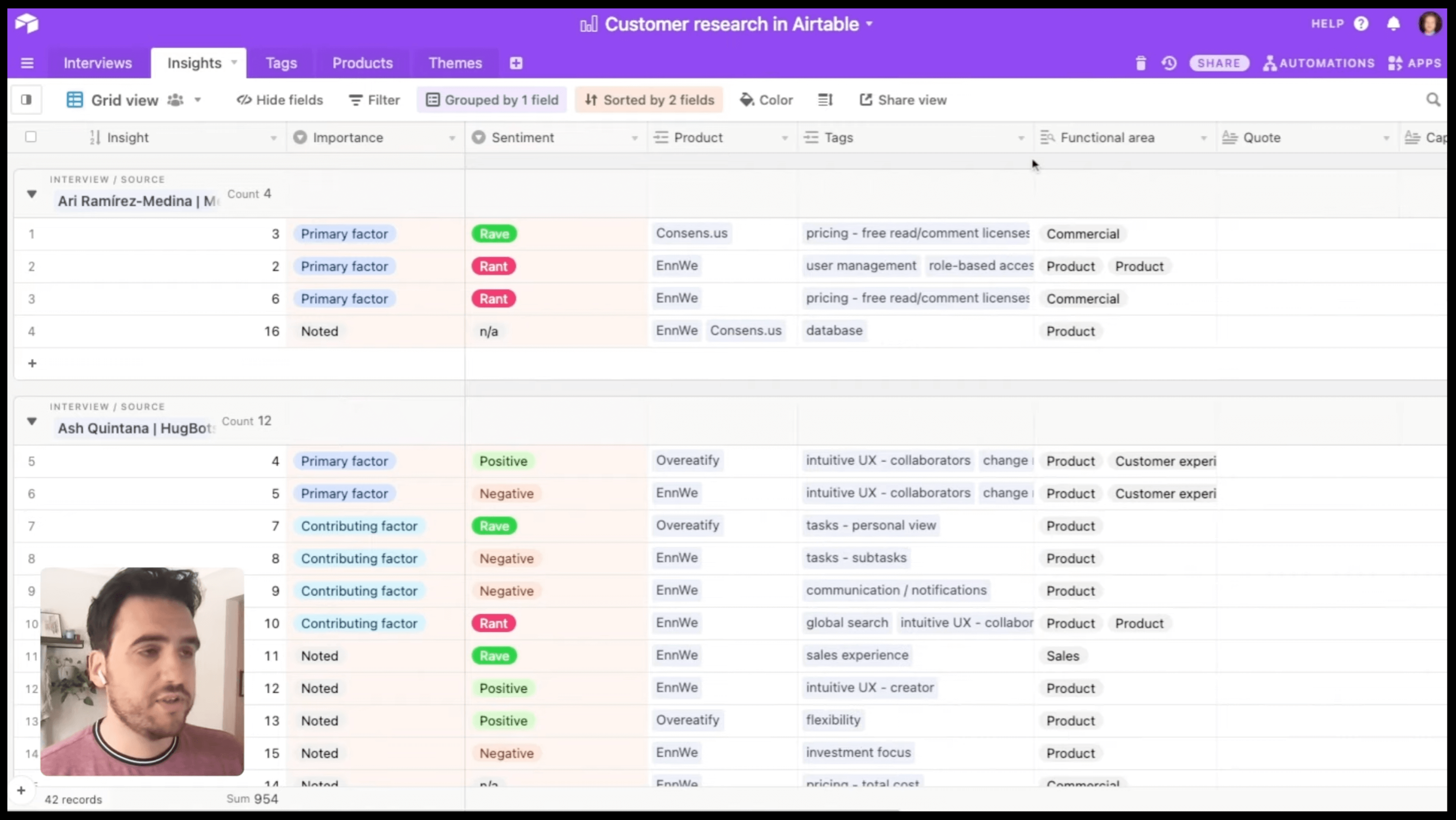 In How Airtable Does Customer Research, Alex McDonnell demonstrates an updated approach to code and count. Here he uses Airtable to distill the patterns in CI interviews.
In How Airtable Does Customer Research, Alex McDonnell demonstrates an updated approach to code and count. Here he uses Airtable to distill the patterns in CI interviews.
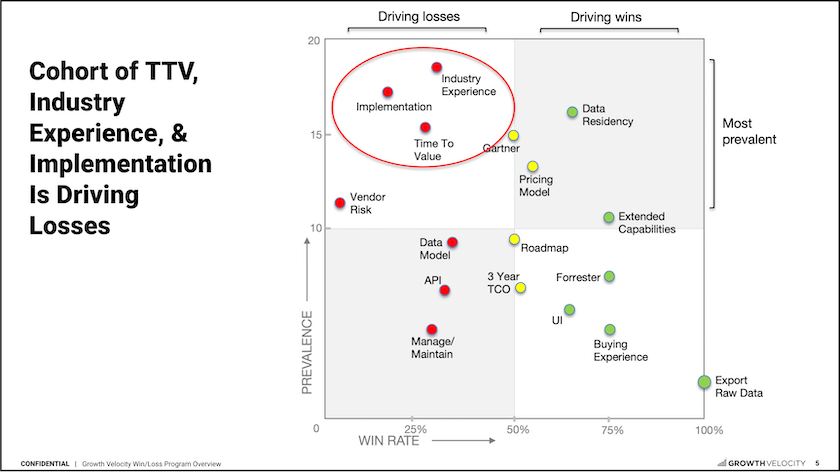 One of the most challenging aspects of win/loss reporting is determining which findings are significant. Which patterns deserve discussion with your stakeholders, and which do not? Check “Win/Loss Analysis Reports: 3 Things You’ll Learn” to see how we prioritize decision drivers by their prevalence, win rate, and cohort effects.
One of the most challenging aspects of win/loss reporting is determining which findings are significant. Which patterns deserve discussion with your stakeholders, and which do not? Check “Win/Loss Analysis Reports: 3 Things You’ll Learn” to see how we prioritize decision drivers by their prevalence, win rate, and cohort effects.
Win/Loss Analysis Templates When Your Data Source Is a Buyer Survey
Surveys are an efficient way to gather data from a much larger sample of buyers than can be interviewed. The big question is what should you ask. We use surveys to: benchmark progress on issues identified during a baseline set of interviews; track competitive presence in sales opportunities; create ratings to produce buyer scorecards; and track evolving criteria and their influence on win rate.
Survey Questionnaire Templates
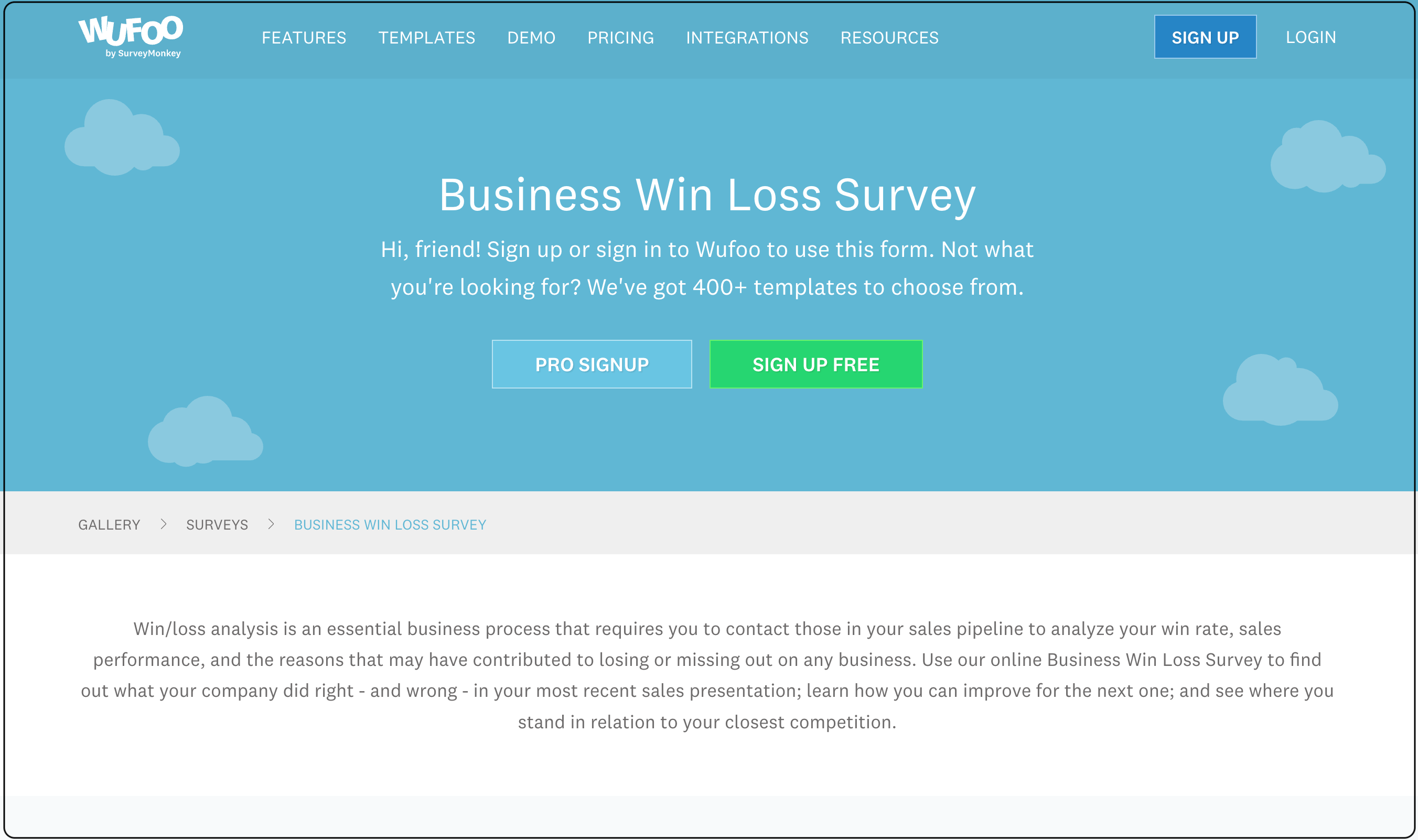 Wufoo’s template for a win/loss survey questionnaire is much too long to be used as-is, but provides plenty of sample questions you can use as a starting point.
Wufoo’s template for a win/loss survey questionnaire is much too long to be used as-is, but provides plenty of sample questions you can use as a starting point.
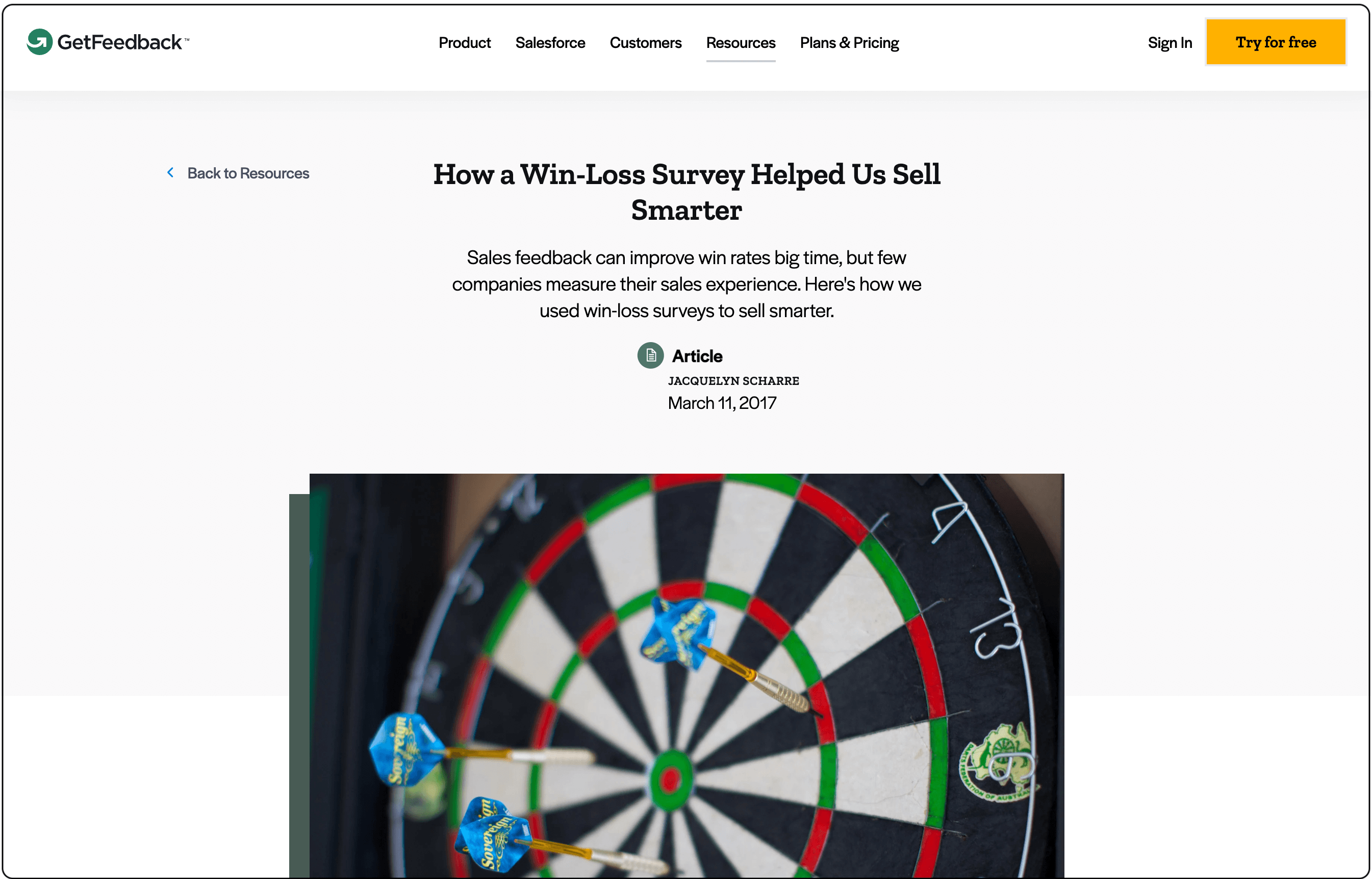 GetFeedback describes their journey using win/loss surveys with both their sales reps and buyers. They share advice for designing and operating win/loss surveys that’s helped them “sell smarter” and “inform some of the most important aspects of our business.”
GetFeedback describes their journey using win/loss surveys with both their sales reps and buyers. They share advice for designing and operating win/loss surveys that’s helped them “sell smarter” and “inform some of the most important aspects of our business.”
Summary
I hope we’ve helped you find the perfect Win/Loss Analysis template for your scenario. Please get in touch with us if you still have questions, or want to learn about our Win/Loss Analysis service.
Win/Loss Analysis isn’t rocket science but there are plenty of intricacies that can make delivery more time consuming and the outputs less compelling. We recommend using a Win/Loss Analysis template to avoid gotchas and quickly deliver important insights.
Related Resources
Selecting A Win/Loss Analysis Consultant? Here Are 5 Tips
Selecting a Win/Loss Analysis consultant is an important decision. Here are 5 tips that will help you make a good choice.
How To Conduct A Win/Loss Analysis
The seven steps described here have been proven through years of in-the-trenches experience.
Guide To Choosing The Best Data Sources For Your Win/Loss Analysis
Pros and cons of four common data sources for Win/Loss Analysis: CRM Reason Codes, Sales Team Surveys, Buyer Surveys, and Buyer Interviews.


